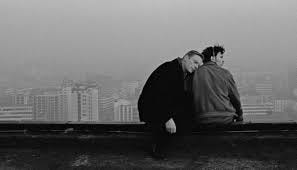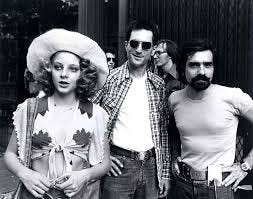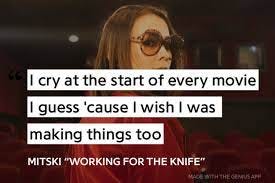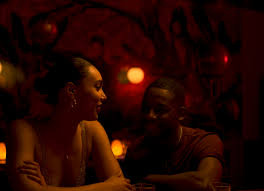On Overcoming the Fear of Being Seen
“The things that tormented me most were the very things that connected me with all the people who were alive, who had ever been alive.” ― James Baldwin
At twenty-three years old, I went into hibernation. As a film student, my life was governed by social media. Instagram was as equally competitive as it was cathartic - an exchange of ideas, a place for creative output, an indicator of beauty. Social media was encouraged as a means of getting ahead, a secret pathway up the ladder of success. I directed my first short film and carefully curated its Instagram page to prove just how cool and interesting and talented I was. Glowing comments and DMs further proved my greatness. I firmly believed the project would be my magnum opus. Obviously, I was wrong. I learned lessons from Icarus the hard way.
During my hibernation period, I was confronted by the anatomy of my shame. I was humiliated, a film school dropout with no money, no sense of direction, and no equipment. I went on long walks to pass the time, with paths marked by mismatched cobblestone bricks, scattered piles of dog feces, and blossoming trees wielding swollen limbs like daggers. My armor was bent headphones blaring songs that echoed words I could never say. I was supposed to be somebody - a star, an artist, my saving grace. Instead, I was a barista at a cafe, making a paltry buck, watching life pass me by.
Work was the only thing going on for me. I was surrounded by fellow artisans, united by our newfound disillusionment in pursuit of realized dreams. We spent our days in service, commiserating over the demoralizing quality of menial labor while dragging oily trash bags and dodging liquid sloshing from their plastic bindings. We exchanged complaints, vape pens, or both on sticky trips to the dumpster. Foreign cinema was my only balm at this time, scouring films for a name to give the miles of regret stuck in the back of my throat. One coworker we’ll call John shared my love of world cinema. He wrote his Letterboxd reviews with the meticulous precision of a brain surgeon in the operating room. We parsed our reviews while I lamented the Western canon and its limited diversity. The most lauded and recognizable work often centered on the white male experience. I was tired of learning about the myriad ways white people experience sadness. After all, I was sad too.
Despite my vehement protests, he encouraged me to watch “Wings of Desire” (1987), an old Wim Wenders film shot in black and white. I spent an evening in the dark weeping at its dialogue, with phrases like “Must I give up now? If I do give up, then mankind will lose its storyteller. And if mankind once loses its storyteller, then it will lose its childhood.” How could something so ostensibly distant from my lived experiences embed itself in the core of my humanness? I was humbled and reminded of the universality of human emotion. Still, the shame found a way to rise as the credits began to roll. I was supposed to be the writer and filmmaker, not the bystander.

I couldn’t face the rest of the world. I dodged plans with coworkers trying to become friends and avoided the friends I already had. I changed my phone number and deleted any trace of me from the internet. Posting was impossible and filled me with dread. I kept myself awake with worries about what people thought about me and my purported failures. That’s the thing about shame; it spreads like a disease, rotting everything it touches. At work, I made a list of my faults and bristled at the times I said or did the wrong thing. My inner critic scolded me relentlessly, while my coworkers greeted me with a genial acceptance - mercies I’ve grown to cherish and aspire to embody. After a particularly rough day at work, my mind ruminated on the what-ifs. What if I had grown up in New York or LA, immersed and trained in filmmaking hubs? What if I had more money or more experience? What if multicultural storytelling weren’t a pursuit, but a guarantee? What if I could be anybody but myself?
I turned on what I thought was some random Netflix original (derogatory) called “Learn to Swim” (2021) to calm my nerves. Unbeknownst to me, divine kismet decided to intervene. It was a quiet, remarkable film that encapsulated my inner world. By the end, I was stunned by a feeling I thought I lost. My purpose was alive and throbbing, if only for a moment. All I used to think about was how to create art that strikes a nerve in the audience, enveloping them in the warmth of recognition. For weeks after, the me I thought I buried revealed herself on the bike to work and ideas scrawled on scraps of receipt paper between customers. The meager offerings from my mind called me back to myself, a lilting hum that gurgled and swelled into a rumbling chorus.
Time continued to trudge forward. I made an Instagram account and deleted it again after a week. To stifle the blow of monthly rent payments, I got a second job at an old movie palace. Vestiges of its greatness lingered in the golden adornments and red wine-colored carpet that suffocated the senses. By the time I worked there, it was a place rife with chaos, trying to stay afloat. Outside, unhoused men lined the city blocks, begging for a gesture of kindness, a beer, or conversation. They were treated like bricks in a building, ignored and degraded by time. Inside the theater, I faced even more unfathomable lows. One patron was caught masturbating in his seat to a young Jodie Foster in “Taxi Driver” - he left traces of himself in creamy splotches staining the carpet. My remaining naïveté eroded in that environment. I was confronted by the decay of humanity as the corroding forces of capitalism were on full display. We witnessed overdoses in the theater lobby, battled a rampant mouse infestation, and navigated a board controlled workplace. There was something about The Movie Theater Palace that attracted lost souls, navigating the seductive nature of their vices, longing for escape in the glittering nostalgia of vintage cinema.

It grew harder to hide amidst the camaraderie of similarly aged coworkers sharing the same aspirations and insecurities I did. After fielding numerous invitations to hang out, I was cajoled into post-shift drinks at a nearby dive bar. I was uncomfortable, hyper-aware of crumbs scattered across the tabletops, crumpled napkins, and sticky round spots from forgotten drinks. I only began to unclench as the shared in-jokes and unrestrained laughter overpowered my senses. What a relief it is to have fun with friends. My no’s started to grow more infrequent. Drinks turned into coordinated film screenings on our off days, which blossomed into raucous karaoke performances that stoked our inner showmen. Without realizing it, my shame began to shrink. It grew impossible to remain obsessed with my faults when surrounded by the unrelenting pain and unmitigated joy shared by others. My inspiration blossomed in the afterglow of my environment. One day, in the liminal haze between film screenings at The Movie Theater Palace, I wrote a poem. It took an entire afternoon of staring out the window and furiously editing my notes app. Admittedly, I was proud. The poem wasn’t even particularly well-written. Yet, it was evidence I could still create, which filled me with an unbridled sense of hope. Years prior, I would have been unimpressed by a measly poem that took four hours to write. My eyes were fixated on the greats who maximized every minute of free time to cultivate excellence. Who has time for enjoyment on the route to success? Working two jobs to survive taught me the liberating intimacy of gratitude for every modicum of inspiration, grace, or opportunity I received. If the Cafe taught me forgiveness, The Movie Theater Palace taught me to dream again.
I am writing all of this as a confession. I’m still afraid more often than I’d like to admit. I was afraid of vulnerability, and spilling my history across these pages. I was afraid of publishing my work or showing my face. So I do it scared, because I have to. I remember who I am now. I didn’t find it in horoscopes or self-help books. I didn’t find it by sulking in my bed or canceling plans with newfound friends. The shame didn’t disappear alone in my room. My community nourished me, the kindness I experienced was potent and infectious. They taught me how to live again. I used to worry often about the passage of time. How the present slips into the past and the future fades into the present. My years as a low-wage worker taught me time’s benevolence. There is no rush. I’m proof that what may seem impossible can evolve into the attained. It was more convenient to feel like Icarus, doomed by my ambitions. Now I’m a woman, which is an incredibly human and imperfect endeavor. I’m writing to let you know the fear may never go away, but the courage grows stronger.




Really appreciated this. You articulated something it took me a while to truly understand. Community is so important to my creative self. This sounds like a given but tapping into creativity is so taken for granted. It is always there but you have to cultivate it, give yourself permission, etc and sometimes you need to be in the right environment/around the right people to truly feel comfortable in your creative skin.
I know you’re a natural storyteller because your words played scenes in my head as I read through
And also because, in sea of substack narrative pieces, I felt compelled to read this one all the way to the end